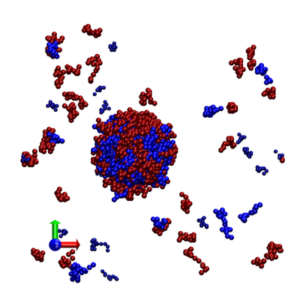Join us as a Masters or PhD student: Surfactants stabilizing surfaces of cellular droplets
Required experience in the following methods:
Statistical physics, molecular dynamics, monte carlo, lattice simulations
Work with:
- Dr. Tyler Harmon | Tel: +49 (351) 4658 1216 | Email: TylerHarmon@ipfdd.de
- Prof. Dr. Jens-Uwe Sommer | Tel: +49 (351) 4658 750 | Email: Sommer@ipfdd.de
Where: Leibniz Institute for Polymer Research Dresden (Leibniz-Institut für Polymerforschung (IPF) Dresden), Germany
Project description:
Biomolecular condensates are a newly defined class of organelle in the cell. In contrast to the classical picture of a cellular organelle, there is no membrane separating the inside from outside. Instead, they form through the physics of proteins phase separating into droplets similar to oil demixing from water. Similar to how soaps can act as a surfactant stabilizing oil:water interfaces, there is a growing interest in the idea that proteins can act as a surfactant to stabilize protein droplets in cells.
In this project we will develop the theoretical frameworks that are relevant for protein scale surfactants and study how these surfactants could be used in cells. Several topics of note are to what extent this can stabilize specific sizes of droplets, how much can this reduce cell-to-cell variability, and if these interfaces can reduce how freely the droplet can exchange material with the bulk around it.
 The key tasks for the project are
The key tasks for the project are
- Run simulations of droplets and surfactants with different ratio of components and other heteropolymer architectures to study how well the behavior fits changes in surface tension.
- Build models for how the system should behave at high surfactant concentration and different curvatures.
- Examine how molecules pass through the surfactant layer and if we can design surfactants that increase this barrier.
For more information: https://www.ipfdd.de/de/forschung/institut-theorie-der-polymere/students/topics-for-master-theses/surfactants-stabilizing-surfaces-of-cellular-droplets/
Current news by our research groups
Agnes Toth-Petroczy Group,Anthony Hyman Group
CD-Code is now published in Nature Methods
 CD-CODE is now published in Nature Methods. It is a “living database” that we designed for fast…
CD-CODE is now published in Nature Methods. It is a “living database” that we designed for fast…
Computational Postdoc or PhD student (m/f/d) in protein evolution and biomolecular condensates
The Toth-Petroczy lab is an interdisciplinary research group at MPI-CBG and CSBD that studies protein evolution. Applications will be reviewed on a rolling basis until the position is filled. The Max Planck Institute of Molecular Cell Biology and Genetics (MPI-CBG) and the Center for Systems…
We are hiring a Software Developer
The Toth-Petroczy lab is an interdisciplinary research group at MPI-CBG and CSBD that studies protein evolution. Applications will be reviewed on a rolling basis until the position is filled. The Max Planck Institute of Molecular Cell Biology and Genetics (MPI-CBG) and the Center for…
Simon Alberti Group,Alf Honigmann Group,Anthony Hyman Group,Marcus Jahnel Group
A role for RNA in Stress Granules assembly
Stress granules are membraneless compartments formed by phase separation of specific molecules upon exposure to cellular stress such as oxidative stress, heat shock, or osmotic stress. The Alberti, Jahnel, Honigmann, and Hyman labs published a study in cell highlighting the role of RNA in the…
Filament formation by the translation factor eIF2B regulates protein synthesis in starved cells
Aminoacyl-tRNA synthetases (aaRSs), the enzymes responsible for coupling tRNAs to their cognate amino acids, minimize translational errors by intrinsic hydrolytic editing. Here, we compared norvaline (Nva), a linear amino acid not coded for protein synthesis, to the proteinogenic, branched valine…
Moritz Kreysing Group,Simon Alberti Group,Anthony Hyman Group
Condensation regulates translation
New insights into the influence of Ded1p condensation on translation comes from the Hyman, Alberti and Kreysing labs. The study published in Cell is entitled "Condensation of Ded1p Promotes a Translational Switch from Housekeeping to Stress Protein Production".
Graphical abstract: